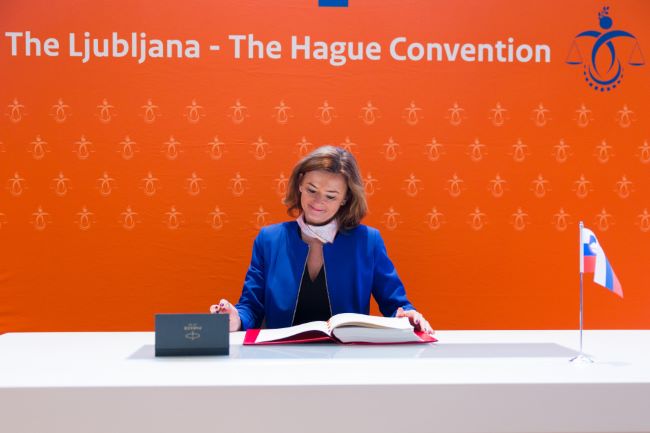Minister Tanja Fajon, representing one of 34 countries, signed the Ljubljana-The Hague Convention on International Cooperation in the Investigation and Prosecution of the Crime of Genocide, Crimes against Humanity, War Crimes and Other International Crimes. The Convention was adopted in Ljubljana in May 2023 after a decade of effort and hard work by Slovenian diplomats and international law experts.
“Today is an important day in the fight against impunity. I am very pleased to have signed the Ljubljana-The Hague Convention on behalf of Slovenia in a triple capacity: as a representative of a state that actively contributes to the fight against impunity, as a state member of the core group of countries that initiated the Convention and as the host of the Diplomatic Conference in Ljubljana at which the Convention was adopted. I would like to see it signed and ratified by as many countries as possible, because only by putting it into practice will we be able to turn the often-heard words ‘Never Again’ into concrete action,” said Minister Fajon after the signing. She added that the Convention fills a legal gap that will significantly reduce impunity for the perpetrators of international crimes, while providing justice for victims.
“Once the countries ratify and start implementing this historic convention, the procedures will be much shorter. For example, if a Ukrainian citizen who is in Slovenia has witnessed or been a victim of a crime in Ukraine, it will be much easier to start proceedings immediately once the countries have ratified the Convention. In the past, it could have taken many years,” the Minister added.
The Ljubljana-The Hague Convention is a landmark treaty designed to help bring justice to the victims of genocide, crimes against humanity and war crimes, and to significantly reduce impunity for the perpetrators of these crimes. The Convention fills a gap in international law and justice by clarifying and strengthening the duties and obligations of states to assist each other in cases of international crimes. It provides a “toolbox” to combat impunity for these crimes and strengthens the role of national judicial systems in prosecuting them.
The fight against impunity has long been a priority of Slovenian foreign policy. This is also reflected in the fact that Slovenia was part of the core group of MLA Initiative states (together with Argentina, Belgium, Mongolia, the Netherlands and Senegal) and organised the diplomatic conference for the adoption of the MLA Convention in Ljubljana.
By the time the Diplomatic Conference opened, 80 countries had endorsed the MLA Initiative. It brought together 53 supporting countries, 15 observing countries, seven international organisations and ten civil society organisations, and today 34 countries have signed the Convention in The Hague.
On the sidelines of the event, Minister Fajon met with the President of the International Criminal Court (ICC), Judge Piotr Hofmański, and ICC Prosecutor Karim Khan. “The Prosecutor and I agreed on the need to speed up the process of detecting and prosecuting the most serious international crimes. This includes Gaza, where we are witnessing a humanitarian catastrophe. I hope that the MLA Convention will make an important contribution to the work of the Criminal Court,” said the Minister after the talks.

